And so it begins. The classic period of the film noir style is opened in style by Humphrey Bogart as Sam Spade in The Maltese Falcon. If you want to catch up with the archive it's to be found here.

Director: John Huston
Starring: Humphrey Bogart, Mary Astor, Sydney Greenstreet, Peter Lorre
Year: 1941
Country of origin: USA
Language: English
Synopsis: Sam Spade's partner is killed whilst on a job for a mysterious female client, Miss Wonderly. Spade investigates the murder and gets drawn in to a search for the Maltese Falcon, a valuable figurine, pitting his wits against the effeminate Joel Cairo, the threatening and devious Gutman and ineffectual punk Wilmer.
What Indie Nights? review

Hello as usual, bbbg-readers, Leah here. You know. What Indie Nights? That's me.
What a week we've had here at Noir HQ, such a week that Toby managed to get his review written last Wednesday and here I sit, Monday afternoon, frantically trying to put the Maltese Falcon into words…
At last, here we are, at the very beginning of the Classic Noir period! It's The Maltese Falcon, guys! The one! The noir! The film that started it all!
I hope that with our last four reviews we've given you all some grounding in noir history, enough for you to question that statement and delve a little deeper into what people mean when they say this. Because, boy oh boy, is The Maltese Falcon is in a different class altogether than any of our proto-noirs. In some ways it's a huge leap forward, mood-wise, setting-wise, and in others almost a step backwards: when I think of the subtleties and nuances of Pépé le Moko, for instance, this shrinks into the corner like a lying dame. For the first thing, it was a direct adaptation of a novel often said to be the last word in hard-boiled detective fiction, which is kind of cheating (if you look at it one way), and kind of the point (if you look at it the other way…). For the second thing, it's very, very American, in a way that the others obviously haven't been, and this sudden change in setting and pace jars a bit in comparison to its Continental forebears.
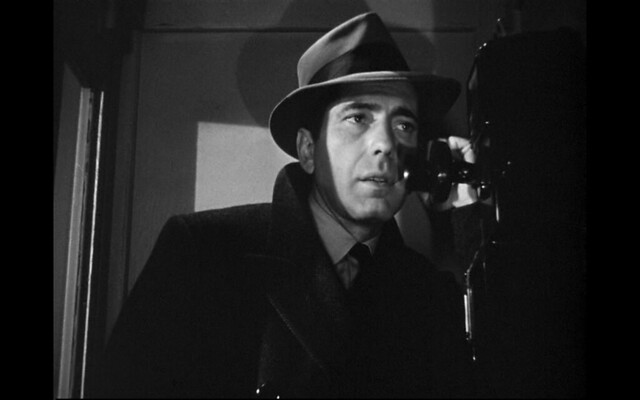
But, of course, there is a reason this is cited as one of the, if not the first noir. It's because it is, of course! Convolutions and one-dimensions aside (and there are a lot, believe you me), you won't find a more noirish noir this side of 1940s Los Angeles (although, shhh, it was set in San Francisco. We don't talk about that).
The Maltese Falcon has mood, it has noir and atmosphere, in spades. It has so much atmosphere you're slapped in the face with it all, you practically walk into a solid wall of Darkness and Underworld and Wavering Morals. It was so in-your-face with its noiricity that for a while I struggled to know what to say - what is there to say about the quintessential noir? All the trademarks are there - Sam Spade is the hardboiled private detective, not quite on anyone's side but his own. Brigid O'Shaughnessy is the femme fatale, leading all the men on in her own dangerous game, lying and cheating every step of the way. The cops growl and threaten and bumble uselessly, the bad bad guys smile and sneer and pull guns on you and knock you out with drugs in your whisky and hate the stinkin' sight of you. Venetian blinds cast stark shadows across faces, dark alleyways and gaudy neon lights abound. Everyone stays in until night, chases everyone else around dark streets at ungodly hours, and stays up till dawn drinking gin and smoking like chimneys and not trusting anyone. Throw all that into a pot and tell me you don't get a delicious noir stew.
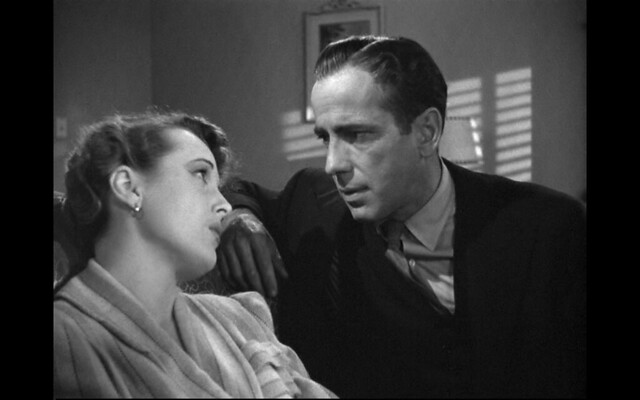
I recently finished reading the book, which may explain why I 'got' a lot more of it this time round - the first time I watched I remember just surrendering myself to the mood, because trying to understand what's going on between all the people and their intrigues and their murky pasts is not a feat most human minds are up to.
It's certainly testament to the mood of noir that having literally no idea how the conclusion was reached made no-never-mind to how much I enjoyed the journey there.
As usual, hop on over to my blog for a companion post, and thanks for having me!
Blahblahblahtoby review

It's well documented that I love this movie, I included it in both of the recent GoSeeTalk blogathons, Cool Off With The Classics and Double Feature after all. I'm not blind to its faults, I just love all of the great aspects that it overshadows the bad. I shall try to be impartial however.
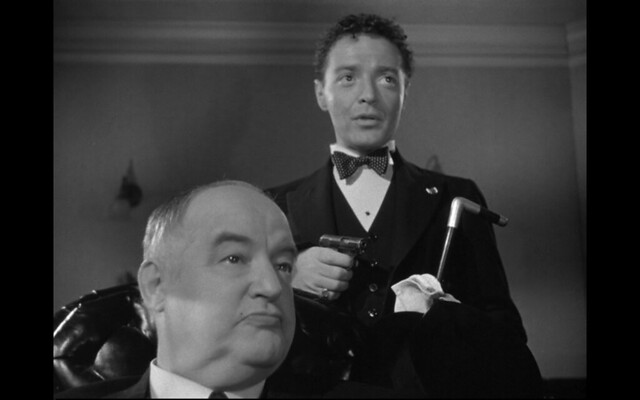
Based on the classic pulp novel by Dashiell Hammett, John Huston helped to create the noir private eye hero that would go on to be the basis for dozens of the type over the next 17 years. Bogart's Spade is a quick thinking, fast talking, self serving gumshoe and it is largely due to his skilled performance that this movie is as enjoyable as it is. But then all of the performances are suberb as some fine actors make the best of some pretty one dimensional characters. If Bogie has only got room to merely hint at the fact that he is upset over the denouement, to show the tiniest fraction of a man in turmoil, then Lorre and Greenstreet have even less to work with.
The two of them are not given much screentime but the hints at a past relationship, unacceptable to show in a Hollywood film of the period, are woven in to their performances. Lorre is almost unrecognisable from the snivelling child killer from Fritz Lang's M, having lost a lot of weight and almost in 'black face' from being so overly made up to look African. Sydney Greenstreet is done a great disservice by being made to look almost comical at times due to his girth, Huston shooting from below the waist making him look like Humpty Dumpty but when allowed to act he is wonderfully powerful and deceptively eccentric.
I don't recall ever seeing Mary Astor in anything else, she reminds me of Celia Johnson in Brief Encounter in terms of her looks, but she gives a good performance as the lying, manipulative angel faced femme fatale. They're all superficial charicatures of one kind or another but it's that kind of movie.
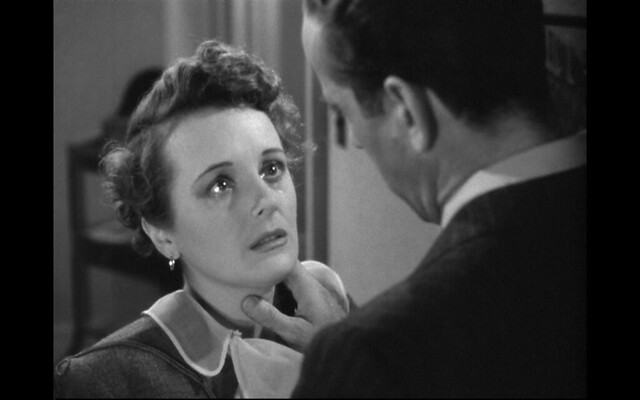
Through these caricatures Huston's noir paints a picture of a bloated humanity, only looking out for itself; if later noirs became known for the poetic idea of a man lost to fate but fighting every battle to the last (see Pepe Le Moko last week) then this is more a noir filled with hard-nosed cynicism.
And Spade is the chief cynic, he knows he's not an angel and he expects nothing more from those around him but he is also conflicted; sleeping with his partner's wife yet he feels he must do something about his murder for example. This conflict between knowing what the right thing to do is and the way of the world he inhabits isn't thoroughly explored and is only touched on explicitly at the end but by watching Bogie throughout you pick up on the small changes in his facial expressions as he says and does one thing because he feels he has to yet clearly does not want to.
Going back to the criteria, we now ask how is this a noir? Huston definitely uses the film as Social Criticism with his cynical look at humanity, Gangsters and Private Eyes are major characters, Sexual Pathology and Murder Taken Lightly (middle class murder) throughout and I invite you to see this movie then go back and read Eberts 10 Identifiers before telling me that he didn't write them about this film.
Brian had such a blast last time that he's back again, munching on the corn I freshly popped for the evening.
 Guest Review
Guest Review Hello all, this is Brian Vs. Movies, weighing in on The Maltese Falcon --- the film that launched a genre. While you can make good arguments that there were films with noir elements before this one, The Maltese Falcon was definitely the first major film noir and has deservedly become the prototype that all other noirs model themselves after. What makes this movie stand so tall?
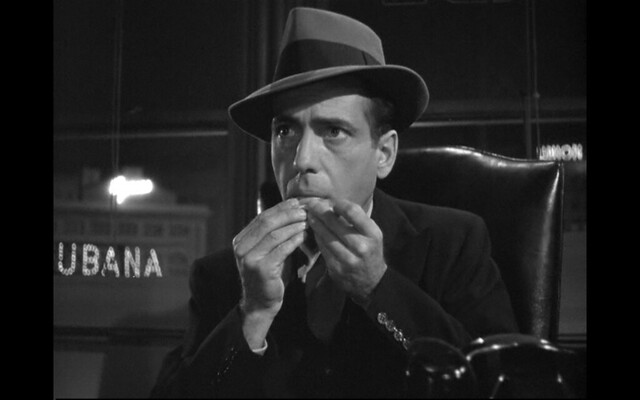
For starters, the script is great. This isn't the first film adaptation of Dashiell Hammett's ridiculously awesome novel (or even the second), but it's the first to stay true to the tone of the hard-boiled source material. Of course, the Hays Code prevented the filmmakers from including references to sex or sexuality, but that is about all that changed from the book to the screen; there is a remarkable amount of dialogue taken directly from the novel, and that dialogue is what really makes this film click.
This was John Huston's debut as a director, but this is one of the most mature filmmaking debuts in history. The cinematography from Arthur Edeson would have been beautiful without Huston's directorial intent, but the result of them working together is a treat for any cinephile. There are scenes with exaggerated camera angles (primarily those featuring Greenstreet) and interesting lighting effects (nearly every shot of Astor), but more importantly, they all have subtle meaning.
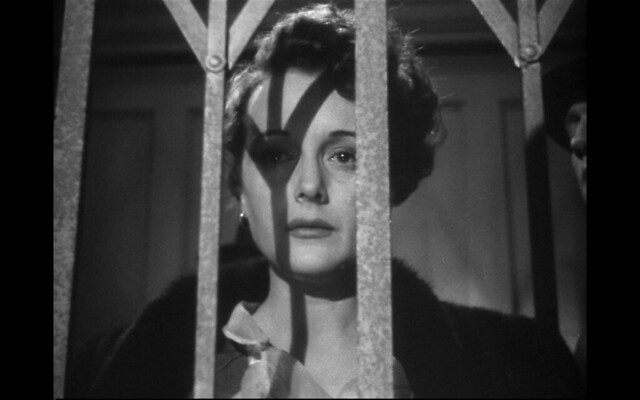
As good as the script and direction are, the acting is what makes this one for the ages. The supporting cast is wonderful, but Humphrey Bogart is the reason to watch The Maltese Falcon. Spade is smart, tough, witty, funny, and almost a sucker for love. I would still love this movie if it was just Bogart delivering a monologue. He's just so damn cool!
I will admit that the plot is not revolutionary and that some small parts of the film might seem a little campy by modern standards. That does nothing to dilute the effect of this film. This isn't just a great noir, it's a giant of cinema and without a doubt, The Maltese Falcon is my very favorite film.
First noir down, I know a lot you will have seen this one so feel free to share your views in the blahs below and any links to reviews you might already have are most welcome.
Coming Attractions!

It's interesting that this is your favorite noir film. I think it's decent, and Bogart and some of the great supporting actors make it worthwhile. However, I felt like Astor is really stiff and not convincing as the femme fatale. I do probably need to revisit it again. Good post.
ReplyDeleteI was fortunate enough to see this on the big screen 3 years ago. In the same year I saw The Big Sleep as well. Whilst I really like Falcon I liked Big Sleep even more as a Bogie film. But as a 1940's film MF must rank as one of the era's best.
ReplyDeletedan - that would be Brian's favourite film. i am yet to decide. i've got another 100+ to choose from!
ReplyDeletebrent - you are a total showoff! i'm totally lime green jello at you. If i remember correctly Big Sleep is a much better movie, not sure if i enjoy it as much as Falcon though. It's a tough call.
Ah!! I'm very fortunate becasue my local museum also has cinema that plays independant, foreign, and classics. So over the last decade or so I've been so lucky to see the likes of Casablanca, Metrolpolis, Lawrence of Arabia, Dr. Zhivago, The Women, Possessed ( Gable & Harlow ) etc, etc, where they belong...on the big screen!
ReplyDeleteThe Maltese Falcon is the easier film to follow as The Big Sleep gets a bit complicated at times. But I still like it over MF for Bogie's performance and some of the subtle humour.
brent - you just made my list of intolerable people who get to watch classics at the cinema! i'm going to have to look in to this. apparently in Australia there's a flat rate of $300 per screening from Village Roadshow. Film Societies everywhere will be inundated with requests from me to pool their resources to entertain me.
ReplyDeleteNice article, guys. This is one of the movies I am most looking forward to on my list, and this post has me even more excited to check it out. Love this noir series, by the way.
ReplyDeleteERIC - again with the nice comments! thank you. you have a noir list or is it just a watch list?
ReplyDeleteMy favorite piece of trivia about The Maltese Falcon is that it proved to be so popular that the studio decided to re-team Bogart, Greenstreet, and Lorre in another movie. The result? Casablanca.
ReplyDeleteCHIP - they're such a great combination, i sort of wish i had put CASABLANCA on the noir list now but at least this way i can watch it whenever i want instead of in chronological order.
ReplyDelete